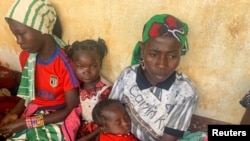NGAM, CAMEROON — Cameroon hosts about 460,000 refugees and asylum-seekers, most of them women and children who escaped violence in the Central African Republic and Nigeria. But while they have found safety in Cameroon, women refugees are not always welcomed by locals, and struggle to survive.
Thirty-five-year-old Mairama Abba cleans her goat house at the Ngam refugee settlement on Cameroon's eastern border with the Central African Republic, CAR.
Abba said she fled armed conflicts in the CAR in March 2015, after her husband and two children were killed in a crossfire between rebels and government troops.
Abba said she and her remaining two children live peacefully at the Ngam refugee settlement in northern Cameroon and are not considering going back to their war- ravaged village called Nyem in the north of the CAR. Abba said money she raises from the sale of chicken and sheep enables her to feed her children and to take care of the children's health needs.
Abba said her first two years in Cameroon were among the most difficult in her life, as she and her children would go without food and water for days. She said the U.N. Children's Fund in 2016 saved her children from dying of malnutrition.
The U.N. and humanitarian agencies say Abba is one of at least 350 women and girls in the Ngam refugee settlement who have since been trained to be self-reliant.
Ohandja Claire Lydie is an official of a charity, the International Medical Corps. She said besides healthcare services, her organization provides training that help refugee women and girls to become less dependent on aid.
She said several hundred refugee women and girls now know embroidery, how to make soap, sew dresses and raise animals at home. She said before training, the women are educated on self-reliance and psychologically prepared to save incomes that will enable the women to improve their living conditions and take good care of their families when they start working.
The World Bank and the U.N. refugee agency, UNHCR, have been providing what they call targeted support for refugees in the form of cash, under a program called social safety nets.
Amma Koutok said she was given $70 from the safety nets scheme in 2018. She said she invested the money in selling palm oil and salt to refugees and Ngam villagers.
Koutok said she saved $300 in three years and bought a maize and rice flour grinding machine. She said their camps women association, assisted by the World Bank and UNICEF has been instrumental in improving the living conditions of refugee women especially widows and women who do not know if their husbands are dead or alive.
Host communities complain that refugees steal food and cattle, provoke conflicts over water resources, lodging and farmlands and cut down trees for firewood.
Helen Ngoh is communication associate of UNHCR Cameroon. She said on this year's World Refugee Day, UNHCR attempted to persuade host communities to sympathize with the refugees.
"Greater majority of Central African Refugees, about 330,000 Central African refugees are still here and they have safety here in Cameroon. If you are forced to flee your home, you should be able to find safety, so this year's theme (of World Refugee Day) is drawing attention to the importance of people who are forced to flee their homes to be able to have safety," said Ngoh.
Speaking on Cameroon state broadcaster CRTV, Ngoh refugees from both the CAR and Nigeria are scared to return home because of violence in their native countries.
Meanwhile, UNHCR says less than 15%of the $154 million needed this year to help displaced Nigerians and Central Africans has been raised.




